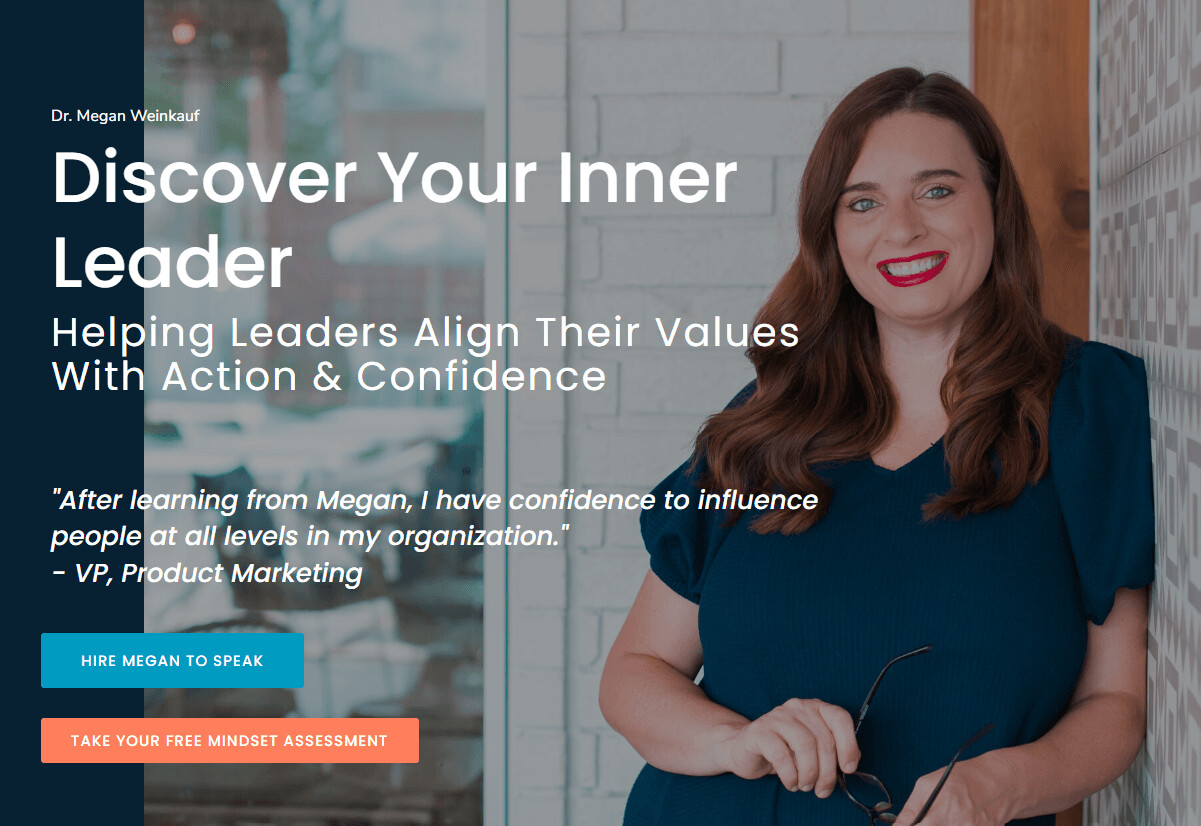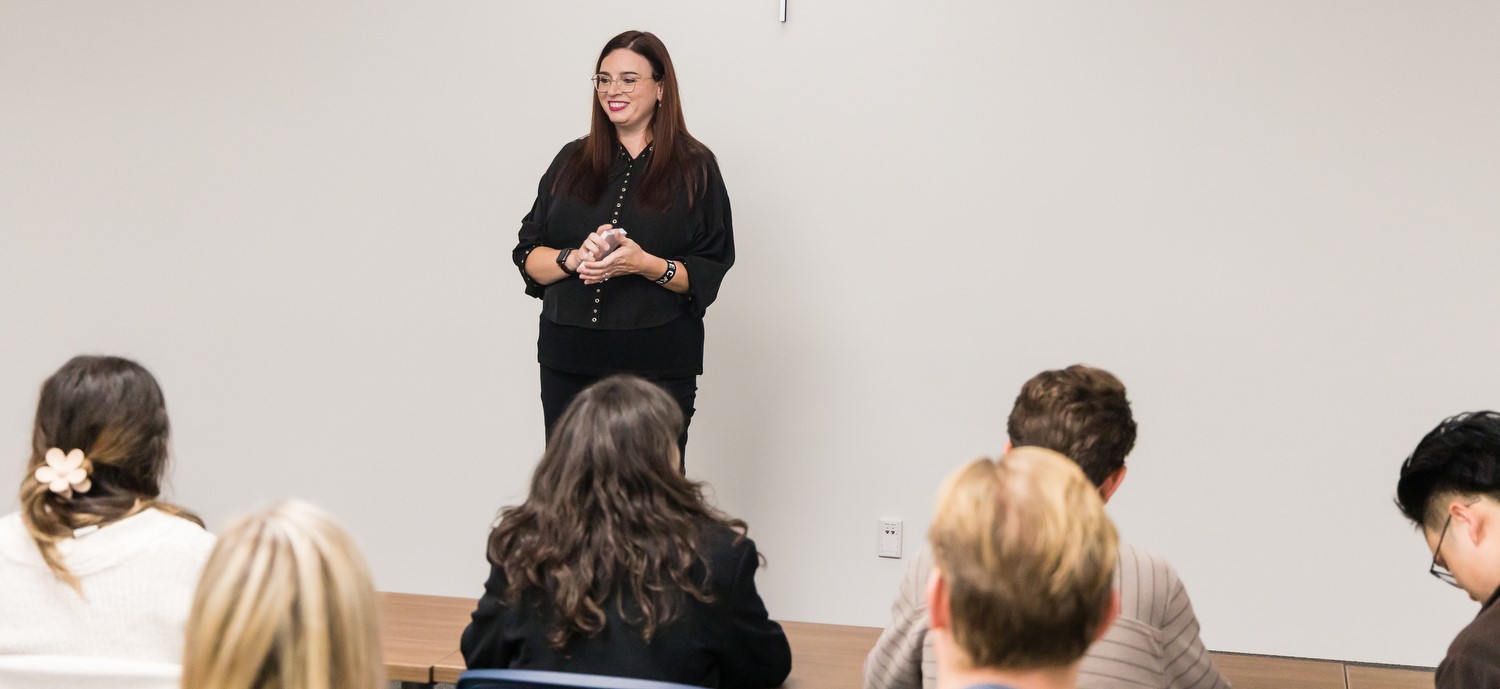We were lucky to catch up with Megan Weinkauf recently and have shared our conversation below.
Megan, looking forward to hearing all of your stories today. What do you think Corporate America gets wrong in your industry?
What Corporate America Gets Wrong About Leadership
Corporate America still misunderstands what it means to truly take care of employees. As a millennial, I’ve seen my generation receive criticism for wanting flexibility, purpose, and a work-life integration. But let’s take a step back—our perspective has been shaped by watching our parents navigate the volatility of corporate America, where people were often treated as machines rather than human beings.
People have emotions, and the best leaders understand the necessity of journeying alongside their employees to support their mental health and overall well-being. Unlike machines, humans go through seasons in life—some easier, some harder. A transformational leader recognizes this and responds accordingly. Trauma impacts employees in ways that Corporate America often ignores, yet research proves that when organizations embrace a trauma-informed, human-centered approach to leadership, everything changes. Employees become more committed, productivity rises, job satisfaction increases, and motivation improves.
Currently, I’m conducting a workplace trauma study, and one of the strongest themes emerging from the participants is a deep yearning for leadership that prioritizes people. They don’t want empty corporate buzzwords; they want leaders who truly care—leaders who hold space for them to process challenges without judgment. Holding space is not a sign of weakness. In fact, it is one of the strongest acts of human consideration. True leadership is about intrinsically validating another person—not for personal gain, but for their well-being.
A Story of Leadership Gone Wrong
I once worked under a leader who constantly preached “open-door policy” but treated every interruption like an inconvenience. Employees were told to “ask questions anytime,” yet when they did, they were met with frustration and passive-aggressive sighs. Over time, people stopped asking. They started making silent mistakes, fearful of the response they would receive if they sought clarity. The result? Increased errors, disengagement, and a culture of fear rather than learning.
If leaders truly want their people to succeed, they must create an environment where learning is encouraged, not punished. Neuroscience tells us that learning is a process—one that requires patience and psychological safety. You wouldn’t expect a child to run before they learn to crawl. So why do so many leaders demand perfection from employees who are still learning?
The Triple Bottom Line: People, Planet, and Profit
As an accountant, I’ve seen firsthand the impact of prioritizing the triple bottom line—people, planet, and profit. Too often, companies focus solely on profit, failing to realize that investing in people actually leads to greater financial success. When employees feel valued, they perform better. They stay longer. They innovate. The best leaders understand this and take the time to develop their people rather than viewing them as disposable.
If you’re a leader reading this, ask yourself:
Do I truly create a safe space for learning, failing forward, and growth?
Do I show patience with my employees, just as I would expect patience when I’m learning something new?
Do I say I have an open-door policy but act like I’m too busy for my team?
The best leaders don’t just lead processes—they lead people. And people, unlike machines, need compassion, understanding, and room to grow. If corporate America could shift its focus inward, investing in its people as much as its profits, the entire system would thrive in ways we have yet to imagine.

Awesome – so before we get into the rest of our questions, can you briefly introduce yourself to our readers.
Meet Dr. Megan Weinkauf: Researcher, Executive Coach, and Founder of The Faithful Leader
I’m Dr. Megan Weinkauf, a researcher, executive coach, professor, and founder of Ciovita LLC – The Faithful Leader (www.thefaithfulleader.com). My work focuses on helping leaders break free from outdated, transactional leadership models and instead adopt a transformational, trauma-informed approach that prioritizes people, purpose, and sustainable impact.
My Journey into Leadership, Research, and Coaching
My path into leadership development and research was shaped by both personal experiences and professional insights. With a background in accounting, auditing, business strategy, process improvement, and higher education, I’ve worked across multiple industries—including aerospace and defense manufacturing, energy, nonprofits, and startups. Throughout my career, I observed a common pattern: many leaders struggled to create environments where people could thrive. I saw organizations prioritize profits over people, failing to recognize that their most valuable asset—their workforce—was being stifled rather than empowered.
This realization led me to study transformational leadership, neuroscience, and trauma-informed practices in the workplace. My research explores how leadership affects employees’ well-being, motivation, and productivity, particularly in high-stress industries. As a professor of management and an executive coach, I bring these insights into my teaching, consulting, and writing, ensuring that leadership development is grounded in both cutting-edge research and real-world application.
What The Faithful Leader and Ciovita LLC Provide
At The Faithful Leader, I guide executives, entrepreneurs, and organizations through transformational change. I offer:
Executive Coaching – Helping leaders develop self-awareness, emotional intelligence, and trauma-informed leadership strategies.
Leadership Development Programs – Tailored workshops, training sessions, and keynote speeches that equip leaders with the tools to lead with integrity, wisdom, and impact.
Research and Consulting – Providing data-driven insights on workplace trauma, leadership effectiveness, and organizational culture transformation.
Ethics and Values-Based Leadership Training – Assisting companies in aligning their leadership strategies with ethical frameworks and long-term sustainability.
In essence, my work helps leaders and organizations transition from outdated, rigid structures to dynamic, human-centered workplaces where people feel valued, engaged, and empowered to succeed.
What Sets Me Apart?
A Research-Driven, Trauma-Informed Approach – Unlike many leadership coaches who focus solely on surface-level strategies, my work is backed by extensive research on neuroscience, trauma, and transformational leadership. I help leaders understand the deep-rooted behaviors that influence workplace culture and decision-making.
Holistic Leadership Development – I believe that great leadership is not just about strategy—it’s about the whole person. My coaching and programs integrate mental health, emotional intelligence, and values-based leadership.
Real-World Application – I’ve worked in diverse industries, from corporate finance to nonprofits, and understand the unique challenges each sector faces. My solutions are not theoretical—they are practical, tested, and effective.
Faith and Ethics-Driven Leadership – The Faithful Leader is built on the principle that true leadership is about service, integrity, and creating environments where people can flourish. Whether you are a CEO, entrepreneur, or team leader, I help you lead with purpose, not just power.
What I’m Most Proud Of
I’m most proud of the impact my research and coaching have had on leaders who are striving to create healthier, more effective organizations. Seeing my clients and students grow—overcoming personal barriers, leading with confidence, and transforming their work cultures—is incredibly rewarding.
Additionally, I’m honored to be leading research on trauma in the workplace, helping organizations recognize how past experiences shape leadership behaviors and decision-making. I’ve also been privileged to work on ethical leadership initiatives, including coaching teams for the Ethics Bowl and serving on the City of Tulsa’s Ethics Advisory Committee.
What I Want Potential Clients and Followers to Know
Leadership is not about control—it’s about transformation. The best leaders are those who invest in their people, creating workplaces that prioritize well-being and innovation.
If you’re struggling with leadership challenges—whether it’s team disengagement, high turnover, or feeling stuck in an outdated leadership model—I can help. Through The Faithful Leader, I provide actionable, research-backed strategies to help leaders unlock their full potential.
Change starts with awareness. Many leaders unknowingly operate from a place of unresolved trauma, perfectionism, or outdated management beliefs. My work helps uncover these blind spots and replace them with a healthier, more effective leadership mindset.
Success is not just about profits—it’s about impact. Organizations that prioritize ethical leadership, employee well-being, and long-term vision outperform those that focus solely on short-term gains.
If you’re ready to lead with clarity, courage, and compassion, I’d love to connect. Visit www.thefaithfulleader.com to learn more about my work, leadership resources, and coaching opportunities. Reach out at [email protected]

Learning and unlearning are both critical parts of growth – can you share a story of a time when you had to unlearn a lesson?
One of the biggest lessons I had to unlearn was that busyness equals productivity and success. For years, I believed that the more hours I worked, the more meetings I scheduled, and the more projects I took on, the more successful I would be. I wore exhaustion like a badge of honor, thinking that if I wasn’t constantly busy, I wasn’t doing enough.
This mindset started in my early career when I was working in corporate accounting and finance and later as a professor, consultant, and researcher. I juggled multiple roles, striving for excellence in everything. But at what cost? Burnout. I reached a point where I was running on empty, constantly pouring into others while neglecting my own well-being.
The turning point came when I started studying neuroscience, trauma, and transformational leadership. I realized that productivity isn’t about working more—it’s about working smarter and being intentional with my energy. The best leaders aren’t those who grind 24/7; they’re the ones who create sustainable habits, set boundaries, and prioritize rest and renewal.
Now, as the founder of The Faithful Leader, I coach executives and business owners on how to lead with impact without sacrificing themselves in the process. I help leaders shift from a burnout-driven hustle to a purpose-driven strategy that fuels both success and well-being.
Unlearning the busyness equals success mindset has not only transformed my life but has also allowed me to help others create a leadership style that is both effective and sustainable. If you’re an entrepreneur or creative struggling with the pressure to “do it all,” I encourage you to redefine success on your terms—one that includes rest, balance, and impact.

How about pivoting – can you share the story of a time you’ve had to pivot?
One of the biggest pivots in my career came when I transitioned from a stable corporate role in accounting and finance to becoming a professor, researcher, and executive coach. It wasn’t just a career shift—it was a complete transformation in how I viewed my purpose, leadership, and impact.
I started my career in accounting and business strategy, working in high-stakes industries like aerospace and defense manufacturing, energy, and startups. On paper, everything was going well. I had financial stability, career progression, and the validation of working in a respected field. But something was missing. I felt unfulfilled like I was merely executing tasks rather than making a meaningful impact.
Then, life threw me an unexpected curveball. I was asked to step into a leadership position in higher education, teaching and mentoring students in business, leadership, and ethics. It was a huge pivot—shifting from spreadsheets and financial reports to guiding future leaders. I had never planned to go into academia, but something about it felt right.
At first, imposter syndrome crept in. Could I really make this shift? Would my corporate experience translate to the classroom and executive coaching? But as I immersed myself in teaching and research, I discovered that my experiences in corporate America had uniquely prepared me to mentor and shape the next generation of leaders.
Now, instead of working in corporate America, I engage with it in a different way. Through The Faithful Leader and Ciovita LLC, I work directly with executives, business owners, and teams to help them lead with integrity, emotional intelligence, and a trauma-informed approach. I consult on leadership strategies, train organizations on ethical decision-making, and conduct research on workplace trauma—helping companies create healthier, more productive work environments.
Looking back, I realize that pivoting wasn’t just about changing careers—it was about aligning my work with my deeper purpose. It taught me that sometimes, the most unexpected detours lead to the most fulfilling destinations. If you’re facing a career or business pivot, my advice is to lean into curiosity, embrace uncertainty, and trust that your skills and experiences will serve you in ways you never imagined.
Contact Info:
- Website: https://www.thefaithfulleader.com
- Instagram: https://www.instagram.com/meganweinkauf_/
- Facebook: https://www.facebook.com/MeganWeinkauf/
- Linkedin: https://www.linkedin.com/in/meganweinkauf/

Image Credits
Chris Humphrey


